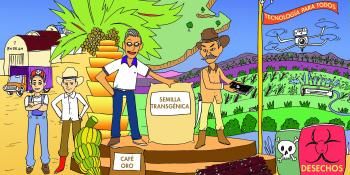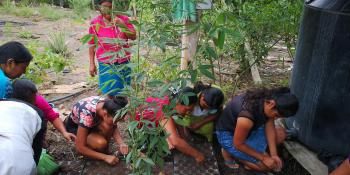Science Forum 2011: The Agriculture-Environment Nexus
The CGIAR is committed to reducing poverty and hunger, improving human health and nutrition, and enhancing ecosystem resilience through high-quality international agricultural research, partnership and leadership. Therefore the Science Forum 2011 will focus on the growing concern about the environmental impacts of achieving global food production targets. There are many different dimensions of the challenge to identify more environmentally sound ways to meet global food needs, in a time of changing climates, depleted supplies of fossil fuels and inputs such as phosphorous and water for irrigation. Sustainable intensification of production is needed. There is also a need to husband and protect environmental services. Our approaches must be equitable; it is essential that the needs of the poorest sectors of the world’s population are met.
The CGIAR is committed to reducing poverty and hunger, improving human health and nutrition, and enhancing ecosystem resilience through high-quality international agricultural research, partnership and leadership. Therefore the Science Forum 2011 will focus on the growing concern about the environmental impacts of achieving global food production targets.
There are many different dimensions of the challenge to identify moe environmentally sound ways to meet global food needs, in a time of changing climates, depleted supplies of fossil fuels and inputs such as phosphorous and water for irrigation. Sustainable intensification of production is needed. There is also a need to husband and protect environmental services. Our approaches must be equitable; it is essential that the needs of the poorest sectors of the world’s population are met.
Producing enough food in a future of changing climate, resource availability and population is the greatest challenge that mankind faces. There is now wide recognition that traditional approaches to improving agriculture are not adequate to meet the needs of a world whose climate is changing and where key inputs for agriculture are rapidly being diminished. New forms of agriculture are needed that support a wide range of environmental services, are resilient to climatic and other external shocks, and are ecologically efficient in use of resources. To meet this challenge new science, new partnerships and modes of collaboration, and improved innovation systems will be needed.
Ecological efficiency must be a major consideration in future agriculture. Agriculture and forestry must become net sinks of carbon and not sources. Agriculture must prosper with fewer non-renewable inputs. The role of low-carbon agriculture in mitigating global climate change will require major technical innovations. There is growing debate of the potential bene!ts of diverse locally adapted resilient farming systems. The potential of biotechnology to go beyond a small number of specific traits in commodity crops, to a broader range of crops tailored for specific conditions. All of these innovations must also sustain continued increases in crop and livestock production to meet demand of more than 9 billion people by 2050.
The Agriculture-Environment Nexus
The theme of Science Forum 2011 is ‘The Agriculture-Environment Nexus.’ It will focus on new opportunities to adapt the agricultural research landscape to meet these emerging challenges. It is proposed that the debate at the Science Forum will be structured around the following themes:
- Land saving and land transformation;
- Resource scarcity and the ecological intensification of agriculture;
- Metrics and monitoring;
- Agro-biodiversity - can biodiverse systems compete in a global market?
- Sustainability Science;
- Multifunctional landscapes.
Who will participate
The biennial CGIAR Science Forum brings together scientists, practitioners, policy makers and funding agents to examine emerging challenges, identify key researchable issues and form new partnerships to address them.
Organizers
Science Forum 2011 will be hosted by the Chinese Academy of Agricultural Sciences (CAAS) and is organized by a steering committee led by the Independent Science and Partnership Council (ISPC) of the CGIAR.
For further information and to pre-register for the CGIAR Science Forum 2011 please visit: www.sciencecouncil.cgiar.org
Head of Research, Sonja Vermeulen will represent CCAFS at the event.
To read the full programme please download the document below.


